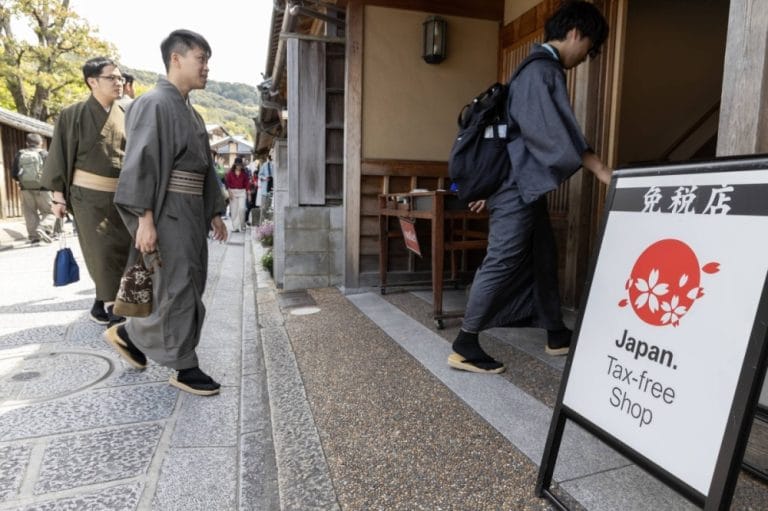🎧 Listen to This Article
The post-pandemic tourism rebound in Japan has brought back the crowds and the controversy. With visitor numbers at record highs and foreign residency increasing, the government is rethinking the costs of openness. The result is a sweeping policy review combining populist impulses with technocratic fixes, and taxes are at the heart of it.
The End of the Welcome Mat?
The Liberal Democratic Party (LDP), long the guardian of Japan’s conservative establishment, is now proposing reforms aimed at foreign residents and tourists. Officials say they want to “restore fairness” to the tax system. Critics argue the country is inching toward economic nationalism under the guise of fiscal responsibility.
The LDP’s proposals target five fronts: immigration administration, health insurance compliance, driver licensing, the tax-free shopping scheme, and the much-criticized ¥1,000 departure tax now set to rise for foreigners alone.
“We need to address growing frustration among the Japanese public,” said Itsunori Onodera, head of the LDP’s policy council. “It’s not just about money. It’s about trust, sustainability, and cohesion.”
Driver’s Licenses and Loopholes
One of the flashpoints involves Japan’s surprisingly lax system for converting foreign driver’s licenses. At present, nationals from certain countries, including several that aren’t signatories to the Geneva Convention on Road Traffic, can qualify with a minimal written test and no practical exam.
Police blame the system for a spate of avoidable accidents, including drunk driving and wrong-lane incidents. A new plan will require applicants to present valid residency records and pass stricter written and practical tests.
“This isn’t xenophobia. It’s public safety,” said a senior official from the National Police Agency.
Health Insurance: The Premium Problem
Japan’s national health care system is another battleground. Foreign residents staying over three months must enroll in employer-based or National Health Insurance (NHI) programs. Yet, in practice, compliance is patchy.
A government survey of 150 municipalities found that only 63% of foreign residents paid their NHI premiums, compared to 93% of Japanese citizens. In Tokyo’s Shinjuku Ward alone, foreign households underpaid premiums by more than ¥1.1 billion in a year.
The LDP’s remedy? Upfront annual premium payment is required during resident registration, and more precise guidance is included during visa processing.
“Many new arrivals come from countries without public insurance systems,” noted one health ministry official. “They simply don’t understand the expectations.”
Tax-Free Shopping Under Fire
The tax-free shopping system, introduced to boost retail sales from international visitors, is now seen as a loophole ripe for abuse. Foreign shoppers can avoid Japan’s 10% consumption tax at point-of-sale, provided the goods are taken out of the country. However, increasing cases involve resale within Japan or tourists failing to take goods abroad altogether.
According to the Board of Audit, the cost to taxpayers is no small change: in fiscal 2022, just nine individuals dodged ¥340 million in taxes through such fraud. With spending by foreign tourists hitting ¥8.1 trillion last year, lawmakers estimate up to ¥2.4 trillion may be tied to tax-free purchases.
From November 2026, Japan will shift to a refund-based system akin to Europe’s: tourists will pay tax upfront and claim it back at the airport if they can show proof. Still, some LDP members want the tax-free program scrapped entirely.
Departure Tax Hike: Only for Tourists
Meanwhile, the Ministry of Finance has set its sights on the flat ¥1,000 departure tax, initially introduced in 2019. Revenues hit a record ¥48.1 billion in FY2024, and the government now proposes a hike only for foreigners.
The move is framed to fund tourism-related infrastructure and manage crowding in hotspots like Kyoto and Okinawa. However, critics warn that it may breach international norms and agreements on non-discrimination.
“If fairness is the goal, then taxing only foreigners achieves the opposite,” said one international trade lawyer.
Naturalization vs Permanent Residency: A Legal Loophole
One surprising twist in the debate involves the relative ease of naturalization. While permanent residency requires 10 years of residency, five years of tax records, and two years of insurance payments, Japanese citizenship can be granted after five years and only one year of financial documentation.
The discrepancy has led to a rise in naturalization applications, which grants full civic rights, including voting. The Justice Ministry now says it will align both systems so naturalization no longer provides a “shortcut.”
“It’s about the integrity of the system,” said Justice Minister Keisuke Suzuki. “Citizenship should be earned, not exploited.”
Policy or Populism?
These measures represent the most comprehensive overhaul of Japan’s immigration and tourism tax policy over a decade. They blend legitimate fiscal concerns with a clear political undertone: responding to domestic unease over the country’s growing foreign footprint.
The real question is whether Japan’s famed pragmatism will ultimately win out over populist temptations. For now, the LDP is walking a fine line, reforming tax policy in a way that risks narrowing the global channels that have helped revive its economy.
For further details, clarification, contributions, or any concerns regarding this article, please get in touch with us at editorial@tax.news. We value your feedback and are committed to providing accurate and timely information. Please note that our privacy policy will handle all inquiries.



